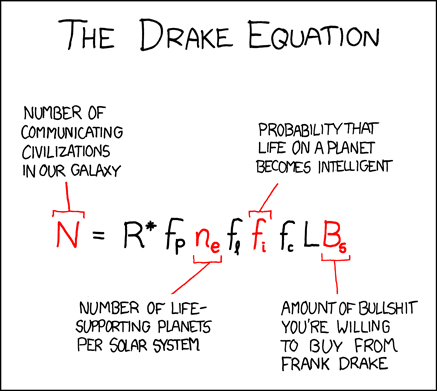

Thinking as a Hobby
3478549 Curiosities served
The Drake Equation
Previous Entry :: Next Entry
Read/Post Comments (2)
If you're not familiar with The Drake Equation, it's supposedly a mathematical way to estimate the number of intelligent civilizations in the universe.
I thought this comic from xkcd was pretty funny:

That pretty much hits the nail on the head. The equation is filled with terms that are basically impossible to estimate. For example, the percentage of planets that will develop life. As the Wikipedia article nicely puts it:
The moral of the story here is that if you want to be a good scientist, you admit when you don't have a fucking clue. What you don't do is pull stuff out of your ass and make up silly equations with terms you can't possibly assign a value to.
I thought this comic from xkcd was pretty funny:

That pretty much hits the nail on the head. The equation is filled with terms that are basically impossible to estimate. For example, the percentage of planets that will develop life. As the Wikipedia article nicely puts it:
Geological evidence from the Earth suggests that [the probability of life arising] may be very high; life on Earth appears to have begun around the same time as favorable conditions arose, suggesting that abiogenesis may be relatively common once conditions are right. However, this evidence only looks at the Earth (a single model planet), and contains anthropic bias, as the planet of study was not chosen randomly, but by the living organisms that already inhabit it (ourselves). Whether this is actually a case of anthropic bias has been contested, however; it might rather merely be a limitation involving a critically small sample size, since it is argued that there is no bias involved in our asking these questions about life on Earth. Also countering this argument is that there is no evidence for abiogenesis occurring more than once on the Earth—that is, all terrestrial life stems from a common origin. If abiogenesis were more common it would be speculated to have occurred more than once on the Earth. In addition, from a classical hypothesis testing standpoint, there are zero degrees of freedom, permitting no valid estimates to be made.
The moral of the story here is that if you want to be a good scientist, you admit when you don't have a fucking clue. What you don't do is pull stuff out of your ass and make up silly equations with terms you can't possibly assign a value to.
Read/Post Comments (2)
Previous Entry :: Next Entry
Back to Top

